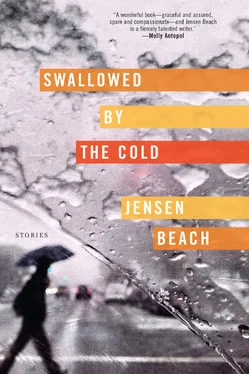Sara looked at her.
“Oh, listen to me,” Louise said, handing the cookies to Sara. “These are for you. Welcome.”
“You didn’t have to do that,” Sara said.
“Of course,” said Louise. “I wanted to. You’re one of us now.”
Sara smiled.
Louise’s face and the top of her chest were warm. She touched her fingertips to her throat. “You’ll like living here,” she said.
“I think so too,” said Sara.
Louise didn’t believe in fate. Every morning she woke up with the thought that that day would be the one something terrible was destined to happen. She did this because she didn’t believe it was possible to predict the future, to know what was coming for each of us. Whatever she believed would happen that day she knew could not, by nature of our inability to predict the future. Lately, she’d been imagining terrible things. Car accidents, robberies, disease. Martin thought it was unhealthy and told her so frequently. “This is a good area,” she said. “We’ve been here for years. It’s very safe.”
Sara fidgeted at the door. “I like this neighborhood. I always have.” She held the cookies in front of her, took a step back into her apartment, smiled politely, and put her hand on the door.
“You could be my daughter,” Louise said.
“Excuse me?” Sara said. She let her hand fall from the door.
“I could have been your mother. I knew your father before you were born.”
Sara squinted a little bit, turned her head slightly to the left. “You’ve mistaken me for someone else.”
“Your father and I were friends,” said Louise. “We had a relationship.”
“I think you’ve mistaken me for someone.”
Louise reached out and touched Sara’s arm. “It was a long time ago. I was in love with him.”
Sara smiled and in the smile Louise, even drunk, located judgment. This was how Jonas looked at her, Martin too. The same sad eyes, the narrow, thin-lipped smile. They pitied her, thought she was ridiculous, incapable, unwell. She hated them all. “A woman died here,” she said.
Sara started to push the door closed. “Thank you again,” she said. “I really should get back to unpacking.”
“She was very old, the woman who lived here before you,” Louise said, stepping forward until she’d nearly entered the apartment. “Her body was found just before Christmas last year. I think she had a stroke.”
“I’m sorry,” Sara said.
“I thought you should know,” Louise said. “I’d want to know.” She put her hand on the door.
Sara looked at her and Louise saw the pity again. “Are you feeling all right?” Sara said.
“Her name was Barbro,” Louise said. She closed her eyes “The woman who used to live here. She was very old. I think that’s the best way to go, don’t you? In your sleep, just like that. I don’t want to sit around waiting for it.”
“Can I help you get back home?” Sara said. “Do you think you’ll make it on your own?”
“They’ve cleaned your apartment. You can’t imagine the smell. Martin told me about it.”
“Do you need help walking back?”
Louise concentrated on holding her head as still as possible. “No,” she said. “It’s just over there.”
In the courtyard, she looked up at Barbro Ekman’s apartment. The blinds were drawn. The light in the front room had been turned out. She was cold. She turned the light on in the stairwell, listened to her shoes click and shuffle against the hard stone. From one of the ground floor apartments loud applause and laughter from a television mocked her. She steadied herself with a hand on the cold wall.
She sat at the kitchen island, on one of the tall stools, the wobbly one, and finished the food she’d fixed earlier. She ate most of a piece of bread with too much butter and drank more scotch. Arman Jahani did not have a daughter. She was sure of this. It was late and she was tired. Martin would be home soon and she wanted to be in bed before he arrived. She stood up to pour herself a glass of milk. Milk soothed her stomach. She would be hungover in the morning but she didn’t care. She reached for a glass on the far side of the counter and as she leaned forward she brushed the plate off the counter and to the floor. Shattered fragments of china tickled her bare feet.
The plate was not a plate. It was only dozens of pieces of thick ceramic, the patterned lines and shapes disrupted, taken apart, put back together to form something new. She got down on her knees and moved the largest piece to one side and began to place the smaller pieces on top. The edges were sharp and she held each piece as tenderly as possible.
She knew it was Martin before he even opened the door. And when he entered the room, she didn’t need to look up to see that she’d been right. “I’ve made a mess,” she said. She pushed aside the plate and picked up a bit of bread with her fingertips and put the bread in her mouth.
“You don’t have to do that,” Martin said. “Please. I’ll get it later.”
“Forgive me.”
“I’ll help you to bed,” Martin said.
“You should have stayed, Martin. You could have stayed. It wasn’t difficult.” She felt his hand on her head. He probably didn’t know the night she was talking about but that didn’t matter. She leaned forward, devoted, rapidly filling her mouth with the bread as if she were kneeling at the altar of a darkened church.
A large frowning sun rushed from one side of the screen to the other. Then the bald-headed meteorologist with the ponytail called for snow on Easter Day. He heard the door open, heard the echo of the stone-floored hallway, and there was a man in the room with him. The man kissed Bent on the cheek, and the channel went to commercial. It was a familiar one. Big discounts if it snowed on Easter. A storm was coming. The man said something. Bent heard, answered on instinct. “I suppose it is,” he said. “One has to take risks now and again.”
It was Bent’s birthday. Eighty-eighth, he thought, maybe eighty-ninth. What did it matter? The war was coming. “There’s a war,” he said. One minute he’d forget this, the next it’d be there, pressing as hard as ice trapped in a narrow bay.
The man held a bouquet of pink and yellow up at his face, smiled behind it. “A vase,” Bent heard. The man went to the kitchen. Bent heard kitchen sounds. Water running, a refrigerator door suctioning closed, a cupboard slammed shut. Then a man came out of the kitchen. He looked familiar but Bent couldn’t place him. “Who are you again?”
The man laughed. “Your grandson. Lennart. I’m here to take you to the museum. The Winter War , remember?” Snow fell onto the balcony. A rusty old chair buried.
Lennart was talking, standing up, moving lips. Bent caught little of it.
The war pressed at his skull, pressed him toward a memory. Had it already been or was it on its way?
“You should wear a suit tonight,” Lennart said.
“Where am I going?” Bent asked.
“The film,” said Lennart. “The Winter War.”
Small details stuck. Morning, 1939, winter. The Soviets had invaded Finland. Article in the paper about bombings, Mannerheim. Three neighbors had already gone off to fight, one a flight mechanic, two in a ski unit. Bent was in Humlegården Park, trying to decide if he should go fight too. There was a need. Swedish volunteers were being accepted. Bare trees lined the pathway. A circle of stone benches surrounded a statue of Carl Linnaeus. The first flakes of snow fell atop orderly hedges.
The palms of Lennart’s hands brushed roughly down Bent’s shoulders, pulling him from that park, from that snow to another. The balcony railing outside had transformed to white. “It’s been a long time since you’ve worn this?” Lennart asked.
Читать дальше











